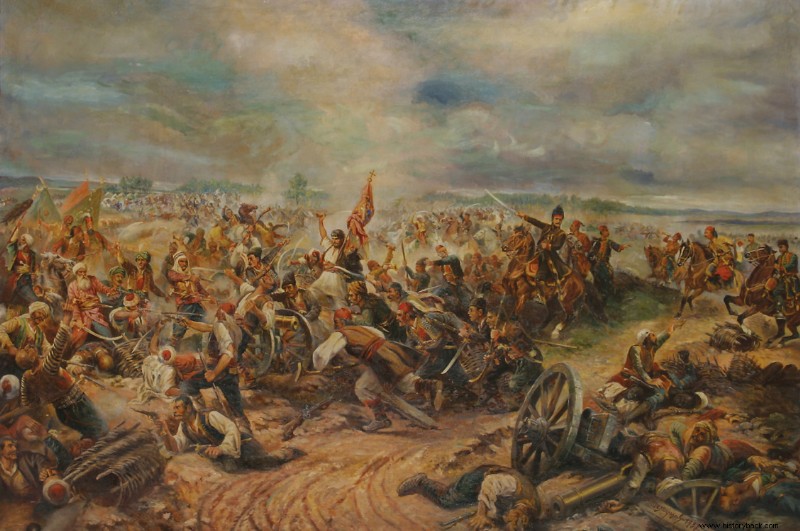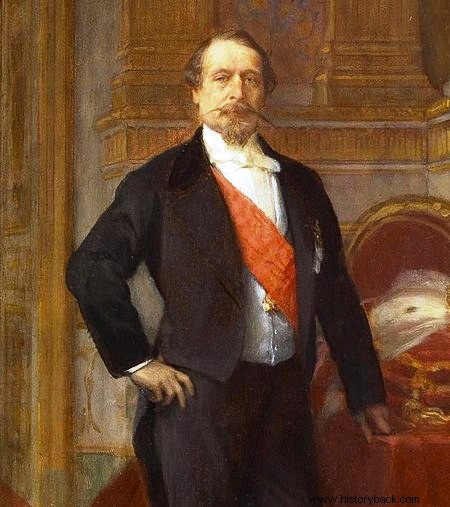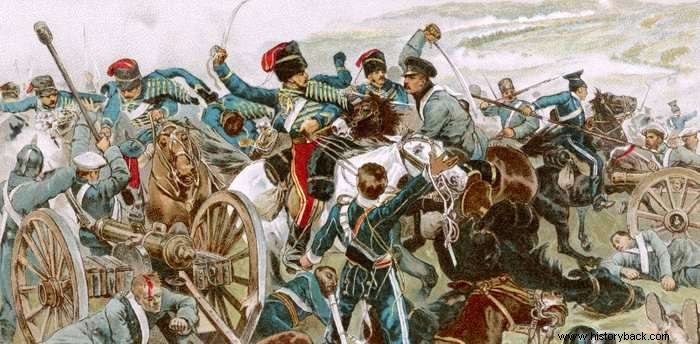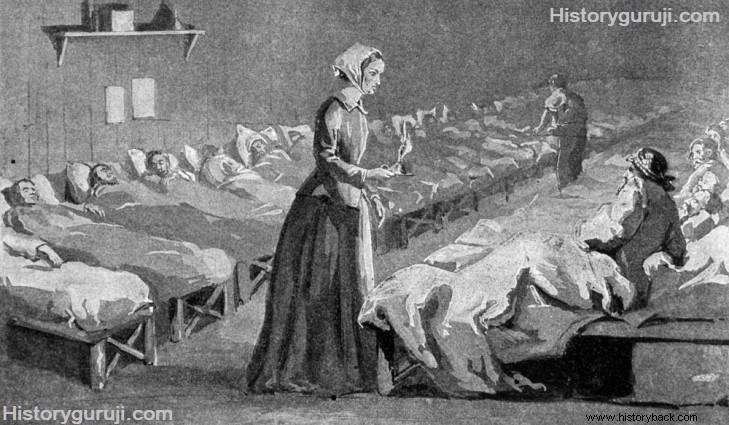The Balkan Peninsula of South-Eastern Europe has its own geographical and historical identity. From the beginning of the fifteenth century to the end of the sixteenth century, Ottoman Turks' continuous invasions and empire-expansion on Eastern European states posed a great threat to the political security, sovereignty, territorial integrity, maritime and trade interests of European states. Christians and Jews of the Balkan Peninsula continued to be exploited due to the intolerant rule and ethnic enmity of the Turkish Empire.
The spread of national sentiment in the mid-eighteenth century led to the Christians of the Balkan Peninsula making independence movements against Turkish sovereignty under the patronage of Russia, leaving most of the Christian states of the Balkan Peninsula from Turkey. began to become independent and the Turkish Empire began to disintegrate. The first state to become independent from the Turkish Empire was Serbia, which gained independence in 1829 with the help of Russia. Following Serbia, Greece, Romania, Bulgaria and Slovakia revolted for independence. The French Revolution of 1789 inspired all European nations with national spirit, due to which the whole of Europe was divided into two parts in the struggle for independence in these states - a faction led by Russia was a supporter of the independence of these states and Turkey. While the other faction of England, France and Austria wanted to save the Turkish Empire from disintegration due to their selfish interests. Thus, in the Balkan Peninsula, for the fulfillment of their national interests and self-interest, the mutual competition among the European nations for profit is called 'Eastern Question' called.
Causes of Crimean War

War of Crimea (July 1853- March 1856 ) was fought around the Black Sea, with Turkey, France, Britain and Austria on one side and the ambitious Russia on the other. The Crimean War was a senseless and inconclusive war It is believed that the war of Crimea was started by Russia against Turkey with the keys of the Church of Bethlehem in Jerusalem and England, France, Sardinia (Italy) joined it due to their own selfishness and ambition.
Russia's self-interest
Russia was a supporter of imperialist policy from the time of Peter. Russia wanted to expand its empire by ending the ailing Turkish Empire of Europe and this ambition of Russia created the problem of balance of power in Europe. The Slavic race lived in the Balkan region of the Turkish Empire, and the Tsar of Russia sympathized with them because of their common race, language and religion. The Tsar wanted to take possession of the Black Sea and the Mediterranean on the pretext of protecting the Slavic race from the atrocities of the Turkish rule. The vision of Tsar Nicholas was already looming over the Turkish Empire. The Jar was convinced that Sick Turkey The empire will die its own death someday, so why not decide its fate before it happens. Nicholas made a plan for the partition of Turkey and went to England himself in 1844 to include England in it, but when England rejected Nicholas' plan, the enraged Tsar Nicholas attacked Turkey with the sword to annex Turkey. attacked. Queen Victoria attributed the Crimean War to the selfishness and ambition of a man (Czar Nicholas) and his servants.
Ambition of France

Napoleon III of the Republic of France in 1848 AD Eventually he became emperor. Napoleon wanted to make his presence felt by participating in the Eastern problem so that he could prove himself the rightful heir of his uncle Bonaparte. France had got special facilities to trade in the Turkish Empire. Napoleon also wanted to establish his trade relations with Egypt and Syria through Turkey.
Furthermore, France is a long-time patron of Roman Catholics living in the Turkish Empire was. Russia's possession of the Ottoman Empire would have meant the end of France's trading facilities and its patronage over Roman Catholics, and France was unprepared for this. Simultaneously, Emperor Tsar Nicholas I of Russia and Napoleon III of France mutual hostility, competition and ambition compounded the eastern problem. Tsar Nicolas did not consider Napoleon the real ruler of France and called him 'My dear friend' He used to say As a result, France decided that it would not allow the Turkish Empire to be occupied by Russia.
England's business interests
England was the first country in Europe to have the first industrial revolution. England needed raw materials for its industries and markets for the consumption of finished goods. England's needs were largely met by her colonies and she followed a policy of fantastic isolation had taken over. But in the second half of the 18th century, the Prime Minister of England, William Pitt, realizing the importance of the Eastern problem, paid attention to it because Pitt did not like Russia's gradual expansion of its sphere of influence in the Near East. Pitt brought the problem of the Near East to Parliament and was largely successful in reducing Russia's growing influence.
Although England considered both France and Russia a threat as both wanted to take over the Turkish Empire, England was wary of the possibility of Turkey's partition by Russia as the Mediterranean Russia's entry into the ocean could create a crisis for England, as well as endanger the Indian colony of England due to Russia's possession of Turkey. England befriended France and decided that it would defend the Turkish Empire to prevent Russia from moving east and would not allow Russian domination over it.
Austria fears
Austria also panicked at Russian expansion towards the Balkans. Like the Balkan region, the Austrian Empire also had a Slavic race. Inspired by the Slavic freedom struggle of the Balkans, the Slavs of the Austrian Empire could also start the freedom struggle. Although in 1849 AD, the king of Austria got his ancestral throne due to Russian soldiers, but Austria was leaning towards France and England to prevent the possibility of Slavic independence movement.
Count Cavour of Sardinia (Italy) also participated in the Crimean War on behalf of the Allies, seeing an appropriate opportunity to raise Austria's atrocities on the international stage.
Urgent Reason
The immediate cause of the Crimean War Keys of the Holy Church of Bethlehem She was Jerusalem, the holy place of Christians, was under the Turkish Empire. The Church of Bethlehem in Jerusalem was built on the site of the birth of Christ. This church was used by both Greek clergy and Roman Catholic. According to a treaty of 1740 AD, France was the patron of Roman Catholics and due to the influence of France, the keys of the church entrance were also given to the Roman Catholics. The Greek clergy had found a key to a small door next to the church, which allowed them to enter the church. Benefiting from the French Revolution, the Greek clergy handed over the key to the smaller side door to Roman Catholics and took the key to the main gate themselves. When Napoleon became emperor of Third France, he sought his patronage of the sanctuaries in 1850, to please the Pope and Roman Catholics, so that Roman Catholics would regain the keys to the church's entrance.
Being a supporter of the Greek clergy, Tsar Nicolas opposed the demand of France and demanded from Turkey to accept its patronage in the holy places. But on the Sultan of Turkey English Ambassador Statford was so influential that he ignored Nicholas' demand. Russia's demand was also opposed by England, Spain, Austria and other Roman Catholic countries. When Napoleon again demanded the protection of Roman Catholics in 1852 AD, after some hesitation, the Sultan of Turkey accepted the demand of France.
Although Russia should not have objected to Turkey's acceptance, Nicholas thought it was a good excuse to annex Turkey and started a war against Turkey. . Actually the Tsar wanted to build a huge Russian Empire palace on the ruins of the Turkish Empire. He took control of the Turkish territories north of the Danube River—the provinces of Maldavia and Valesia—in July, 1853, when the Turkish Sultan refused his patronage over Greek Christians. Done.
The Beginning of the Crimean War
On October 4, 1853 AD, the Sultan of Turkey demanded from Russia to vacate his territories of Maldavia and Valesia. Turkey also declared war on October 23, 1853, on Russia's rejection of this demand.
The events of the Crimean War can be divided into two phases - the first phase from 23 October 1853 to 28 March 1854 AD Can be considered when there were only Russia and Turkey in the war. The second phase can be considered from 1854 AD to 1856 AD May be when England, France, Austria and Sardinia also joined in the war.
First Step
From October 23, 1853 to March 28, 1854, only Turkey and Russia fought. After the declaration of war, Turkey attacked Russian forces on the banks of the Danube River.
On November 30, 1853, a Turkish fleet was heading towards Batum, when a Russian fleet attacked Sinap All the Turkish soldiers were killed at a place called. At this time the combined fleet of England and France was in Kustuntunia. In both countries, the massacre of Turkey in Sinip caused great fury.
The Sinap incident forced Austria to declare war. England and France in early January, 1854 AD to assist Turkey The combined naval fleet of the U.S. reached the Kalasagar and fought for the defense of Kustuntunia Gallipoli I decided to build fortifications. On 27 February 1854, France and England warned Russia that Russia should vacate Turkish territories. On March 28, 1854, France and England declared war on Russia.
But before the armies of France and England could converge on the west bank of the Black Sea, Russia withdrew its forces from the Turkish occupied territories of Maldavia and Belesia, and thus The war is over.
Step II

Although Russia vacated Maldavia and Valesia and The cause of the war was over, but the Allies were not allowed to withdraw their forces without fighting. Allied Russia military base Sibastpol wanted to have rights. The British army under the leadership of Lord Reglan and the French army Marshal St. Arenaud reached Crimea on September 14, 1854, but both countries had no information about Crimea.
On 17 September the Allies began to advance towards Sibastpol. Russian Army on 20 September 'Battle of Alma ' in the face of the Allies in which the Russian army withdrew. Russian general Tadelben He tried to defend the fort by entering the fort of Sibastpol. The Allied forces besieged the fort for 11 months. The English army had to suffer a lot in the siege of Sibastpol. Thousands of British soldiers died of cold due to the Russian Allied snow. Due to lack of traffic, food shortages and weapons disorder, then Aberdeen of England The cabinet had to resign and Palmerston Became Prime Minister.'
Lady with the Lamp ' Florence Nightingale, popularly known as arranged the service of Allied soldiers with female volunteers, leading to the foundation of the Red Cross lying.

Death of Jar Nicholas and Friends in 1855 AD Russia became completely incapacitated as the nations took over the Sibastpol and thought it futile to continue the war.
Napoleon III was also not in favor of war and it was not for England to fight Russia alone. As a result, the war ended in March 1856 by the Treaty of Paris.
Treaty of Paris, 30 March 1856 AD (Treaty of Paris, 30 March 1856 AD)
30 मार्च 1856 ई. को इंग्लैंड, फ्रांस, आस्ट्रिया, तुर्की, सर्बिया, सार्डीनिया तथा रूस के प्रतिनिधियों ने पेरिस संधि पर हस्ताक्षर किये। पेरिस की संधि में अन्य बातों के अलावा मुख्य बात यह थी कि डेन्यूब नदी को सभी देशों के जहाजों के लिए खोल दिया गया। रूस को सिबास्टपोल के दुर्ग का पुनःनिर्माण करने से रोक दिया गया, कालासागर को तटस्थ क्षेत्र घोषित कर दिया गया और किसी भी देश के युद्धपोत के लिए निषिद्ध कर दिया गया। रूस को कालासागर से अपने युद्धपोत हटाने पड़े, किंतु पंद्रह वर्ष के भीतर ही यह संधि निरर्थक हो गई।
क्रीमिया युद्ध के परिणाम (Results of Crimean War)
क्रीमिया युद्ध का सर्वाधिक महत्वपूर्ण परिणाम यह हुआ कि रूस का कुस्तुन्तुनिया पर अधिकार करने और काला सागर को रूसी झील बनाने का सपना भंग हो गया।
क्रीमिया युद्ध के फलस्वरुप एक ओर जहाँ रूस की तुर्की को हड़पने की योजना विफल हो गई, वहीं दूसरी ओर तुर्की को नवजीवन मिल गया।
क्रीमिया युद्ध के पश्चात् सर्बिया को स्वतंत्रता मिल गई, जो अन्य पराधीन देशों के लिए प्रेरणा स्रोत साबित हुआ।
क्रीमिया युद्ध का एक महत्वपूर्ण परिणाम यह निकला कि इंग्लैंड और फ्रांस में मित्रता स्थापित हो गई। इंग्लैंड को धन-जन की अपार क्षति हुई। नेपोलियन ने फ्रांस की पराजय का बदला रूस से ले लिया। आस्ट्रिया के द्वारा तटस्थता की नीति से रूस तो नाराज था ही, इंग्लैंड और फ्रांस भी नाराज हो गये और आस्ट्रिया मित्रविहीन हो गया।
इटली के दूरदर्शी काउंट कावूर ने मित्र राष्ट्रों की ओर से क्रीमिया में सेना भेजकर और पेरिस संधि में शामिल होकर इटली की समस्या को अंतर्राष्ट्रीय बना दिया, इसलिए कहा जाता है कि क्रीमिया के कीचड़ से ही इटली एकीकरण हुआ .
